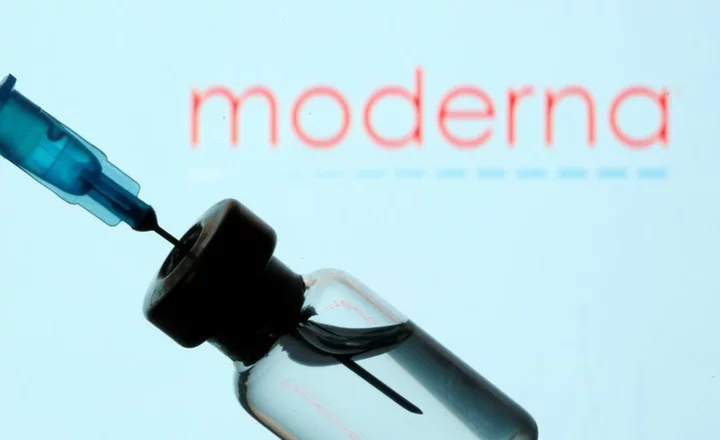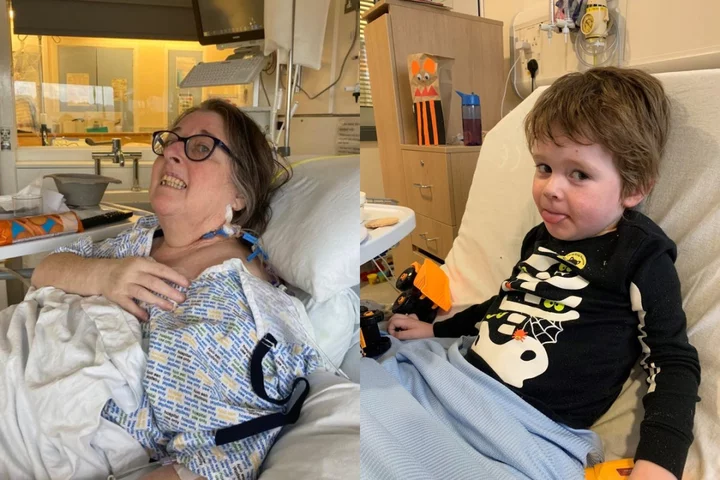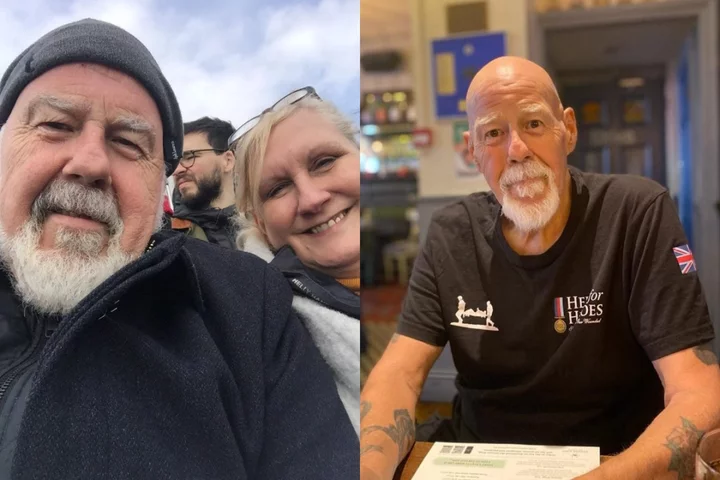
Moderna, Pfizer say updated COVID shots generate strong response vs newer variant
By Patrick Wingrove (Reuters) -Moderna and rival Pfizer on Wednesday said their updated COVID-19 vaccines generated strong responses in testing
1970-01-01 08:00

Astellas withdraws lawsuit challenging Medicare drug price negotiation plans
Japan-based Astellas Pharma on Wednesday withdrew a lawsuit filed against the U.S. government, days after its prostate cancer
1970-01-01 08:00

Swine fever detected in Sweden for the first time
STOCKHOLM A dead wild boar in Sweden has tested positive for African swine fever, Sweden's Veterinary Institute said
1970-01-01 08:00

Visit Any National Park Property for Free on September 23—or Volunteer to Help Maintain Them
On September 23, 2023, you can visit the Statue of Liberty, Alcatraz Island, or any of the 400-plus other monuments, parks, and historical sites overseen by the National Park Service for free.
1970-01-01 08:00

Grandmother and grandson who had sepsis at same time ‘lucky to be alive’
A grandmother who contracted sepsis which made her hallucinate, have “blotchy skin” and turn the “colour of stone” later found out that her four-year-old grandson had the condition and Strep A at the same time as her, with the pair being “lucky to be alive”. Lorna Conaghan, 63, a retired business control analyst from Gourock, Scotland, and her grandson, Alfie Crawford, four, had sepsis at the same time, and Lorna “just couldn’t believe it”. In September 2022, Lorna was due to have a shoulder replacement, but on the morning of the surgery, she “did not feel right” and felt “on edge and weak” – but put it down to nerves. Little did she know this was her first warning sign of sepsis. After informing the doctors, they soon realised that one of her organs was infected and she was admitted to the hospital’s high dependency unit. The following day, Lorna was diagnosed with sepsis as her skin began to look mottled, and doctors told her that she “would have been dead” if it was caught any later. After having antibiotics and a few more hospital visits, Lorna began to recover, but it has taken her 11 months to “go back to normal” and have regulated blood pressure. When Lorna was in hospital, her grandson Alfie, who was three at the time, had chicken pox and a cold, which developed into sepsis and Strep A. Lorna thinks that because Alfie’s mum knew about her symptoms of sepsis, it helped her realise something was wrong. Alfie’s lungs were “full of pus”, so he was put on a ventilator and was in an induced coma for over a week. He also had to “learn to walk again”, and slowly has been able to make a full recovery – with Lorna saying the family are “so lucky to still have him”. Lorna told PA Real Life: “Alfie got sick when I was in hospital, and when I found out I just couldn’t believe it. “I think me having sepsis made Alfie’s mum realise that he had more than just a cold and chicken pox. “We’re both so lucky to still be here and that Alfie is back to running around and having balls of energy.” On July 4 2022, Lorna broke her arm after slipping on her dog’s tennis ball and ended up needing a shoulder replacement. On the day of the surgery, September 30 2022, at Inverclyde Royal Hospital, Greenock, she began to “not feel right” but put it down to nerves. She said: “I told the doctors and they tested me for Covid, but I was negative, and after a few more tests they thought one of my organs might be infected. “They thought it was my heart to begin with, but they couldn’t figure out what organ it was. “The biochemist worked out which antibiotic would best kill the infection, so I was put on that straight away.” Lorna stayed in the hospital for nine days, with seven of them being on the high dependency unit. She said: “They thought it was my kidneys, so they were trying to get them functioning again. “With hindsight, it was terrifying, but I didn’t realise how serious it was at the time. “I was a strange colour, the colour of stone, and I was all blotchy. “Doctors said if they caught it much later, or if I wasn’t in hospital, I would have been dead.” Four weeks later, Lorna was admitted to the high dependency unit again after her GP noticed she had extremely low blood pressure and low heart rate. She said: “I was so confused – when family members would visit me, I’d ask them to leave because I was hallucinating and didn’t want them to see me like that. “I thought there was a castle outside the hospital – I thought I was seeing it outside my window, and I remember thinking that we’ll have to go there once I’m out of hospital.” Since then, it has taken Lorna 11 months to get “back to normal” and her blood pressure regulated. She said: “I’m still having problems with my liver, but now I’m just tired. It’s really taken it out of me. I can only take the dog so far, I’m just so tired all the time.” While Lorna was in hospital, Alfie’s mum informed her that he was feeling unwell. Stephanie did not want to worry Lorna when she was already sick, but it turned out that Alfie, who was three at the time, had also contracted sepsis. Lorna said: “He came home from nursery with chicken pox, and also had a bit of a cold. “Then it just got worse – he was having terrible pains in his back, and I think Stephanie had just listened to what I had said about my symptoms, and it made her realise subconsciously that he might be more unwell than he is coming across. “They called the paramedics, and that night he got a lot worse – when they arrived at A&E, she took him up to the desk and said, ‘We’re going to have a dead child if we don’t do something’.” Within half an hour, Alfie was admitted to intensive care at Glasgow Children’s Hospital and doctors soon realised his lungs were “full of pus” and that he had sepsis, which had turned into Strep A. So, Alfie was put on a ventilator and was in an induced coma for over a week. “Doctors made it clear to Alfie’s family that it was indeed life-threatening and that he was very lucky to be alive Lorna Conaghan Lorna said: “He had to learn to walk again – he was so weak after he woke up. “Doctors made it clear to Alfie’s family that it was indeed life-threatening and that he was very lucky to be alive. “His legs were so weak – he hadn’t eaten much while being poorly.” After having antibiotics and being in the induced coma, Alfie is now “running around”. Lorna said: “With me, I’ve had a good life, but it was so unfair to think that little Alfie could have died – he hasn’t had a life yet. “We’re just so lucky to still have him with us. “This whole experience has made me appreciate everything – when I take the dog for a walk I have a sit down on the bench and take in all the lovely scenery. “I have treated every day since Alfie and I got better as a bonus day in my life.” Read More Amy Dowden reveals ‘life-threatening’ sepsis diagnosis amid cancer treatment BBC Radio 2’s Tony Blackburn reveals he had sepsis and pneumonia in health update Martha Mills: Parents of girl who died after NHS mistakes call for new right to get second opinion Charity boss speaks out over ‘traumatic’ encounter with royal aide Ukraine war’s heaviest fight rages in east - follow live
1970-01-01 08:00

Cancer-hit dad who planned his own funeral defies doctors’ three-week life expectancy prognosis
A father-of-three who was told he looked like “Casper the ghost” before being diagnosed with acute myeloid leukaemia (AML) and given three weeks to live, meaning he has planned his own Requiem Mass and funeral, has defied doctors’ expectations by outliving his prognosis by more than a year and said he is going to “keep fighting”. Dennis Blackman, 62, a former chartered building surveyor and carer who lives in Eltham, London, said he has always been active – playing rugby, lifting weights, and going to the gym at least three times a week. However this all changed when he suffered an unexpected stroke in 2015. His health deteriorated over the following years, he had a hip replacement at 58, and after experiencing symptoms of extreme exhaustion, cold hands, and muscle weakness in early 2022, his wife Sally, 62, a former flooring showroom manager, suggested he book a doctor’s appointment. After weeks of blood tests and blood transfusions in hospital and being told he looked like “Casper the ghost” because he was so pale, he underwent a bone marrow biopsy, and this led to the devastating news in March 2022 that he has AML – a type of blood cancer – and three weeks to live. Dennis told PA Real Life: “I just broke down and I had this unbelievable feeling of guilt because I said to the consultant: ‘What have I done wrong? How do I tell my children and wife?’ “It’s a huge burden to put on someone, to tell them that you’re dying and it’s going to be very quick. “We had many dark days, and every time I looked into my children’s eyes I just burst into tears… it was a very emotional period for all of us.” Dennis, who has lost 50kg (7st 9lbs) since his diagnosis, did not start chemotherapy until months later due to him being too weak, and in January 2023, he was told the chemotherapy was “not working any more”. From that point on, he said he wanted to “enjoy each day” rather than pursuing more aggressive forms of treatment – and since then, he has planned his own Requiem Mass with hymns such as How Great Thou Art and Ave Maria (As I Kneel Before You), as well as the arrangements for his funeral. Now, Dennis continues to drive, go shopping, and enjoy time with his family, and he said he is going to “keep fighting” during the time he has left as “you only have one life”. “Every day you go to bed and you think: ‘Am I going to wake up tomorrow?’ And then each morning you think: ‘Is it going to be today that I’m going to die?’” Dennis explained. “It was extremely difficult in the beginning and I tried to shut the world out… but as time went on, I realised you can’t live like this forever. “You only get one life, so I’m going to do everything I can to keep fighting.” During his 40s and early 50s, Dennis said he enjoyed going out for meals with his wife Sally, playing rugby with his sons James, 37, and Joe, 31, and keeping fit by going to the gym several times a week. He foresaw spending his days in retirement with his family, out in the garden, or fishing, but he said this all changed when he had a stroke in 2015, aged 54, and his health declined from then on. In early 2022, he spent six weeks at Queen Elizabeth Hospital in London after noticing some unusual symptoms and was told: “You look like Casper (the ghost), you’re very anaemic.” He then underwent several blood tests and blood transfusions, and although he had “an idea” that he may have cancer, he said he could never have prepared himself for his diagnosis on March 31 2022. “About one o’clock, I had a knock at the door and I thought: ‘That’s ominous’,” Dennis said. “The consultant and the specialist nurse came in and they said: ‘Unfortunately it’s bad news, you’ve got severe AML and there’s not a lot we can do at this stage.’ “’You’ve got three weeks to live, and I’d advise you to go home and tell your wife and family, and make sure everything’s in order because you haven’t got long left’.” Given Dennis has severe neutropenia as well – a low number of white blood cells – he is at a higher risk of contracting serious infections, and this meant he missed several family celebrations in the months that followed, including his grandson’s birthday party and stepdaughter’s wedding. He developed multiple chest infections and fevers and was not deemed fit enough to start chemotherapy straight away, and he ended up spending three months in hospital from July to October. “We thought we were going to lose him, he was so ill,” Sally, who has been married to Dennis for 10 years, explained. “Even the consultant thought we were going to lose him. “I was scared because I just thought: ‘How can this be happening when we’ve only just met each other?’ We just thought we were going to have the rest of our lives together.” However, Dennis, who is Catholic, said he “fought and prayed every day”, adding: “I said to the consultant: ‘If you promise to me you won’t give up on me medically, I promise I’ll fight this all the way.’” Dennis was determined to get better and, with the help of a physiotherapist, he built up his strength – and at one point, he was walking 10,000 steps a day along the hospital corridor. Towards the end of October 2022, Dennis said “everything seemed hunky dory” and he commenced the first of four rounds of chemotherapy, where he experienced nausea, exhaustion, and “tremendous leg bone pain”. By January, he was told the chemotherapy was “not working”, but rather than trying other forms of treatment, he said he wanted to “enjoy the little things” and the time he has left. He has planned his own Requiem Mass and funeral to relieve any pressure from his family, but also to give him “strength” and some control over his destiny – and aside from his regular check-ups and blood tests each week, he is setting himself small milestones, such as attending a Madness concert at the O2 in December. Although he is “struggling to survive”, he said he would do “anything to get another day” – and that is why he is holding onto hope and wants to encourage others never to give up. “Even though I pray every day, not once have I asked God to take it away from me – all I ask is that He’s with me when I need him, to give me the strength to carry on fighting,” he said. “Leukaemia is painful and every day I question whether I’ll see another day, but we just try and keep going and I hope that my story gives hope to others. “I’ve still got lots of memories to make yet, so I’m going to fight this all the way.” For more information and support, visit Leukaemia Care’s website at leukaemiacare.org.uk Read More Charity boss speaks out over ‘traumatic’ encounter with royal aide Ukraine war’s heaviest fight rages in east - follow live One in 10 ‘spending beyond their means’ – try these 7 cutbacks guaranteed to save families money What is combination cholesterol therapy, as study suggests it could save lives? Cancer cases in young people ‘are rising’ – the warning signs to look out for
1970-01-01 08:00

One in 10 ‘spending beyond their means’ – try these 7 cutbacks guaranteed to save families money
Times are hard, and it’s no surprise to learn many people are spending more than they earn. New research has found one in 10 people spend more than they have in their current account at least seven months each year, and more than half (59%) spend more than they earn at least one month a year. The research, for website TopCashback, also revealed that while parents with children under 18 typically have just £179 left in the bank the day before payday, nearly three-quarters (73%) of people feel they don’t have their spending fully under control, with nearly half (47%) citing the rising cost of living as the cause. And around two-fifths (41%) admit they feel anxious about the cost of living on a weekly basis. “So many people are guilty of spending above their means – let’s face it, it’s why credit cards are such big business,” says finance expert Vicky Parry, head of content at MoneyMagpie. She says emotional spending can be a real issue, pointing out: “When we feel deprived of something, it makes us seek out that dopamine to feel good, so we online shop, and we buy things we don’t even need.” And Rajan Lakhani, a money expert at the smart money app Plum, says: “With wage growth now beginning to exceed rising costs, households may be tempted to spend even more.” But he stresses it’s important to try to get any high interest debts down before succumbing to spending temptations, and notes there are plenty of easy ways for families to reduce their spending. Here, Parry and Lakhani outline their tips for family cutbacks as the cost-of-living crisis continues to bite… 1. Avoid brands Parry advises families to stop buying branded goods in the supermarket, pointing out that the mark-up can be huge. “More often than not, it’s made in the same factory as the supermarket’s own-brand product,” she says. “If you equate a brand as a stamp of good quality, then try to change this mindset – look at the taste awards and you’ll see many own-brand and cheaper products are superior.” 2. Get the kids involved with cutting energy bills If they’re old enough to understand, talk to your kids about why it’s important to switch off lights when they leave a room, and why the heating might not be on as much when winter comes. Lakhani says: “As a dad, I’m having to constantly tell my eldest daughter to switch off the lights when she’s left the room. That helps in the short-term, but explaining to children why it’s important to do this, whether it’s the benefits for household bills or the environment, means they’re more likely to remember.” He says smart meters also provide a fun way to bring cost-saving to life for kids, as they can see the impact of switching off lights or turning off appliances that aren’t being used. “It becomes a game for them, and you can create competitions around who’s being the most energy-efficient,” he suggests, pointing out that children’s help could make an important difference, as although energy bills have fallen, prices are still far higher than they were at the start of last year. 3. Budget Keeping your eyes firmly on a budget is the first step towards stopping overspending, stresses Parry, who points out there are some good budgeting apps that tell you what your monthly budgets should be. “Have lists of items you want, items you need and items that will make your life easier,” she suggests. “If you see a top in the sale, yet ‘top’ isn’t on those lists, you’re being impulsive. It’s a good way to remember what you genuinely need.” Lakhani says it’s crucial to budget in the supermarket, and families need to “develop your special superpower” against clever in-store marketing ploys. “Have a set budget and shopping list, and ringfence how much you want to spend on groceries,” he advises. He suggests buying groceries online can help with set budgets, because you can see how the costs are totting up as you put them in your virtual trolley. “Buying groceries online also reduces the chances of being tempted by impulse purchases and kids asking for extra things, while also being easier to find offers,” he says. 4. Childcare share After-school clubs may be a necessity for some parents, but the cost can be crippling – Parry points out that the average fee for an after-school club is usually between £8-£15.50 per session, so five days a week for the 39 weeks of the school year can cost as much as £2,925 per child per year. But you can cut that cost completely, she says, by getting a group of trusted parent friends together and taking it in turns to have all the children over after school for one night each a week. 5. Walk more Although it’s often tempting to use the car for short trips like the school run, Lakhani stresses: “Walking the kids to school is not only good for your pocket, but for the planet and your health. It also gives you more face-to-face time with your children, so you have more time to know how they’re feeling and what’s going on at school. “With petrol costs on the rise again as oil prices are increasing, this is a relatively simple way to cut your costs.” 6. Beware of hobby stacking Hobby stacking is when kids develop a passion for a particular pastime, and then forget it and move on to another within a few weeks. “Before you go out and buy all the kit and gear for something which is essentially a phase, try and borrow it from a friend, or make do, until you’re sure this passion is a long-term investment,” Parry advises. 7. Cut nappy costs If you’ve got a baby, nappies can cost a small fortune, but Lakhani says you can save money by buying them in bulk or having a subscription, which are often discounted. “If you’re buying in bulk,” he says, “ensure you don’t purchase too many, as you could be left with nappies that are the wrong size as your baby grows.” In addition, compare the price of nappies at different retailers, or for an even cheaper option, use reusable nappies. Not only are they cheaper (in the long run), but they’re better for the planet too. Read More Charity boss speaks out over ‘traumatic’ encounter with royal aide Ukraine war’s heaviest fight rages in east - follow live What is combination cholesterol therapy, as study suggests it could save lives? Cancer cases in young people ‘are rising’ – the warning signs to look out for How construction expert Daniel Ashville Louisy went from social media star to TV host
1970-01-01 08:00

Seal praises his and Heidi Klum’s daughter Leni for making him ‘a better person’ in rare post
Seal has spoken about his close relationship with his and his ex-wife Heidi Klum’s 19-year-old daughter, Leni Olum Klum. The musician, 60, took to Instagram on 4 September to share a snap of him and his daughter in New York City together. In the caption, he described how Leni has ultimately shaped his life, and pointed out how grateful he was for her. “In NY with the young woman who changed my life for the better 19yrs ago. Thank you Leni for making me a better person,” he wrote, before signing the tribute with: “Love you, - papa.” In the comments, Leni expressed her love for her father’s post, writing: “So cute! I love you papa,” along with a red heart emoji. Many fans of the singer went to the comments to praise his sweet relationship with Leni. “So much love in this photo! Have a wonderful time together!” one wrote, while another added: “Daddy and Daughter. Beautiful!!” The young model was born in May 2004, right after Klum split from Leni’s biological father, Italian businessman Flavio Briatore. In December 2009, Seal legally adopted Leni when she was five years old, while the singer and supermodel were still married. The former couple went on to have three more children: sons Henry, 17, and Johan, 16; and daughter Lou, 13. Klum filed for divorce in April 2012. This isn’t the first time that Seal has shown his support for the 19-year-old. During an interview with E! News in March, he spoke out about Leni’s career, as she has followed in her mother’s footsteps by becoming a model. While he noted that he’s “so proud of everything that Leni has done”, he’s “more proud of everything that she is”. “She walks through life with this type of humility that allows her to move so gracefully through it all and she has an innate understanding of people in general and people’s feelings,” the singer explained. “So I’m kind of more impressed with everything that she is.” Seal - whose real name is Seal Henry Olusegun Olumide Adeola Samuel - also spoke candidly about co-parenting with his ex-wife, adding: “I’d like to think, as a parent, that we have - between her mother and myself - that we’ve instilled some of that in her. But she can do no wrong in my eyes and she’s quite wonderful.” Earlier this year, Klum applauded her daughter for working on her mode;ling career while studying in college. “I’m very proud of my daughter and her modelling. And she’s studying at the same time, she’s juggling already,” the America’s Got Talent judge said during an interview with People in March. Meanwhile, Leni has also spoken out about working in the modelling industry as the child of two famous parents. During an interview with People in October 2022, she acknowledged that she “got a lift into” the modelling world due to her upbringing. “It’s just a fact. My parents are famous,” she said. However, when she was asked about the infamous “nepotism baby” label given to children of celebrities, Leni said it’s her own work ethic that has helped build her career thus far. “I did get help starting off, and I know that people would dream to start off with what I had,” the college student explained. “I’m so grateful that I’ve been able to take what was gifted to me by my mom. But I am doing the work and putting in the time. Now I’m working on my own, travelling alone, going to school. My mom and I just have the same love for the same thing.” Although she said that her own ambition has led her to success in her career, she still credited her parents for instilling a strong work ethic in her at a young age. “They have both taught me to be myself, and to do what makes me feel comfortable,” she said. “You can tell if you’re not comfortable and then the best of you isn’t brought out. I just think you should be open and honest with what makes you comfortable, be yourself, do what you love.” Read More Heidi Klum opens up about her and husband Tom Kaulitz’s 16-year age gap Heidi Klum’s model daughter Leni shows off grisly burn after admitting she ‘didn’t use enough sunscreen’ Heidi Klum gushes with pride over daughter Leni for ‘juggling’ modelling and college Heidi Klum denies she counts calories after report she eats 900 calories a day Sleeping pill could reduce levels of Alzheimer’s proteins Marathon runners on why autumn is the best time to start running
1970-01-01 08:00

Jimmy Buffett's sister reveals she was diagnosed with cancer 'about the same time' as him
When the late singer Jimmy Buffett was diagnosed with a rare skin cancer about four years ago, his younger sister Laurie Buffett McGuane was diagnosed with pancreatic cancer not long after.
1970-01-01 08:00

McConnell's office releases new health update after second frozen moment
Senate Republican Leader Mitch McConnell's office released an update about the 81-year-old Kentuckian's health after he froze in front of cameras last week for the second time in as many months.
1970-01-01 08:00

Analysis-US healthcare stocks roiled by investor tug of war over economy
By David Randall NEW YORK U.S. stock fund flows into and out of the healthcare sector have swung
1970-01-01 08:00

Marathon runners on why autumn is the best time to start running
Whether you have fallen out of love with running, or have always been curious about giving it a go, finding the right time to start can feel like the biggest obstacle to getting going. With the heat of summer behind us, and winter not fully on our doorstep yet, autumn could be ideal. Here, seasoned marathon runners share why right now is the best time to get into jogging… The weather is ideal Instinctively, you may feel it’s not the best time to start training as the weather begins to get colder and wetter, and the days get shorter. “However, the cooler temperatures can offer a range of benefits,” says Tahir Shams, founder of Tooting Run Club, who ran the 2023 TCS London Marathon. These include a “reduced risk of overheating and dehydration, and it supports increased endurance which is vital for longer runs”, Shams adds. Autumn training brings opportunities for different kit and environments, too. Marathoner and Human Disco Ball fundraiser Freya Morgan enjoys the change of weather. “I get to leave behind the sticky summer weather and busy parks and go back to fresh morning runs right as the sun rises,” explains Morgan, who recently completed a 200km run for Bail for Immigration Detainees. “In the autumn, I might still head out in a T-shirt and then as the weather gets colder, a long-sleeved layer, and then will take another long-sleeved top or jacket with me, and tie it around my waist or cram it into my hydration pack,” she adds. Kit could be cheaper Exercise kit is at its most expensive generally in January, when everyone and their mum is trying to tackle a new fitness goal! Getting in there a bit earlier and snapping up some end-of-season summer gear that’s on sale, before the new season’s clothing and shoes come in, may help you build a running wardrobe you love. If you look good, you feel good, after all. The race calendar If singing up for a race will help keep you motivated to keep running, starting in autumn could put you in a good position to take on a challenge in spring. Plenty of races happen as the seasons change from the cool of winter, with the London, Tokyo and Paris marathons all taking place in spring. Half marathons take place in cities across the UK in spring too, in locations from London to Inverness. Plus you’ll find plenty of 5k and 10k options. Creating a mood-boosting routine “In September, kids go back to school and the summer is over, so it is a kickstart for your health and fitness goals,” explains Ania Gabb, an ASICS Frontrunner who has completed more than 30 marathons. “Many people may want to get into a consistent fitness routine after the excess of summer and before the winter starts,” she notes. This can be especially important ahead of the dark days of winter, which as Shams notes, “can often feel like a gloomy time of the year… Endorphins released during running is a good way to banish the winter blues.” There’s less pressure than January Finally, it can particularly helpful for beginners to start in autumn – skipping the pressure of the new year. “If you are a beginner, autumn is a really nice time of year to pick up running. You are away from the pressure of January resolutions, and the crowds of the summer, and still have some fair weather days and sunlight to get you motivated,” says Morgan. “By the time the darker bits of winter roll around, you will hopefully be in enough of a running routine to use those runs to power through the dark and soggy days. I have been running for 11 years and when my mental health dips, running has always helped.”
1970-01-01 08:00
